| World |
| Old friends, new beginnings | |
|
|
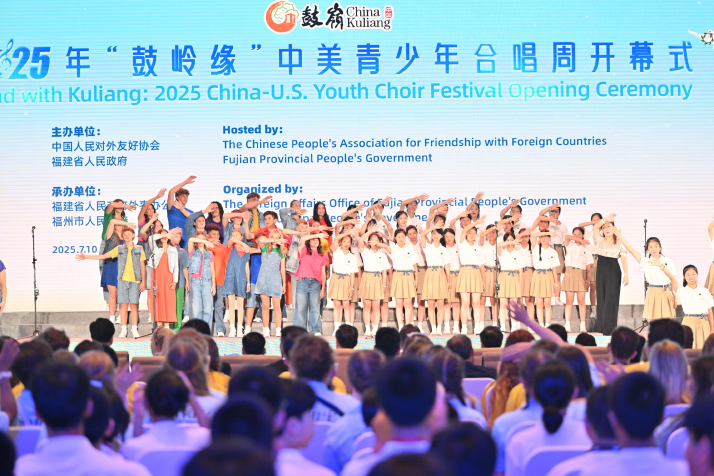 The Yuying Choir of Fuzhou No.16 Middle School joins the One Voice Children's Choir from the U.S. in performing the song Kuliang! Kuliang! during the Bond with Kuliang: 2025 China-U.S. Youth Choir Festival Opening Ceremony in Fuzhou on July 10 (COURTESY PHOTO) "Ladies, your performance was really amazing!" As the members of the Yuying Choir of Fuzhou No.16 Middle School stepped off the stage, many of their peers from across the Pacific rushed over, greeting them with typical American exuberance. After a brief moment of surprise, the Chinese girls—whose average age was just 15—quickly responded with the same warmth and friendliness. "Our American friends were so warm and enthusiastic, and in that moment, we felt deeply moved," recalled Hu Zimo and Yang Ruichang, both 13-year-old members of the Yuying Choir, when speaking with Beijing Review. On July 10, at the Bond with Kuliang: 2025 China-U.S. Youth Choir Festival Opening Ceremony in Fuzhou, capital of southeast China's Fujian Province, their choir performed the original song Kuliang! Kuliang! alongside the One Voice Children's Choir from the U.S. The joint performance, met with thunderous applause and cheers, became the evening's emotional high point and opened a new chapter in the century-long friendship between China and the U.S., rooted in the shared legacy of Kuliang. 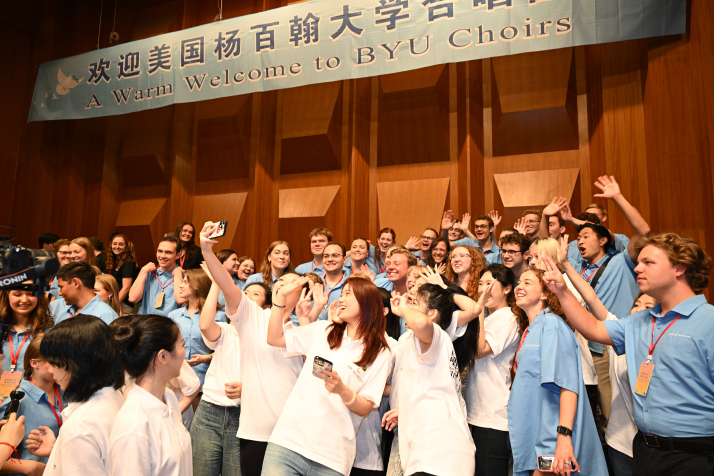 The singers of Women's Chorus from Brigham Young University (BYU) in Utah, the U.S., pay a visit to Fujian Normal University in Fuzhou, Fujian Province, on July 11 (COURTESY PHOTO) Kuliang, Kuliang The bond with Kuliang perhaps came into the spotlight in February 1986, during the final days of Milton Gardner, a physics professor at the University of California. As he lay dying of late-stage cancer, he kept murmuring a single word: "Kuliang." His wife, Elizabeth Gardner, knew he had spent 10 years of his childhood in China—but sadly, he never had the chance to return. Determined to fulfill his last wish, his widow made several journeys to China in search of the mysterious place. With the help of Chinese students and a postmark found among Milton Gardner's belongings, she eventually traced "Kuliang" to a hillside resort on the eastern outskirts of Fuzhou in the southeastern Chinese province of Fujian. Beginning in the 1880s, this area served as a summer retreat for Fuzhou's affluent families and expatriates, many of whom built and lived in villas. Born in 1901, Milton Gardner had spent nearly his entire childhood—until 1911—there. In April 1992, Xi Jinping—then serving as secretary of the Fuzhou Municipal Committee of the Communist Party of China—came across this touching story in People's Daily, China's most widely circulated newspaper, and extended an invitation to Elizabeth Gardner to visit the city. That August, she returned to Kuliang and reunited with nine of her late husband's childhood Chinese friends, at that point all in their 90s. In February 2012, as vice president of China, Xi shared this very story—one he had personally taken part in—at a welcome luncheon hosted by American friendship groups in Washington, D.C. From then on, the name "Kuliang" began to resonate more broadly in both China and the U.S. With strong backing from the Chinese People's Association for Friendship with Foreign Countries (CPAFFC) and the Fujian Provincial Government, more stories of China-U.S. friendship tied to Kuliang have continued to emerge. Building on the momentum of the 2023 China-U.S. People-to-People Friendship Forum and the 2024 China-U.S. Youth Festival, the 2025 China-U.S. Youth Choir Festival has grown even larger in scale. From July 9 to 18, over 500 American youth from nine choirs across eight states—including Utah, Washington, Illinois and California—joined 23 Chinese choirs in Fuzhou, Beijing, as well as other cities on the Chinese mainland, to take part in joint performances, school visits, and flash mob activities, deepening cultural ties through music and exchange. "This Choir Week is a tangible action to implement President Xi's initiative to invite 50,000 American young people to China over the next five years. It also marks the largest themed youth exchange between China and the U.S. since the establishment of diplomatic ties," Yang Wanming, President of the CPAFFC, said. At the opening ceremony of the Choir Week, Zhang Qingwei, Vice Chairman of the Standing Committee of the National People's Congress, China's top legislature, remarked that because of the promotion of Xi, the story of Kuliang continues to be passed down, brimming with vitality. "I hope you will carry forward the torch of history and become envoys of friendship who contribute to the development of China-U.S. relations, ensuring the flame of friendship is passed down from generation to generation," he encouraged the youth of both nations. Everlasting friendship On the morning of July 11, around 97 members from two Brigham Young University (BYU) choirs in Utah gathered at the concert hall of Fujian Normal University in Fuzhou for a musical exchange with their Chinese peers. When Brent Wells, conductor of the BYU Select Singers Choir, asked how many of them were visiting China for the first time, nearly every hand in the room shot up. David Chong, President of the U.S.-China Youth and Student Exchange Association in Washington State and one of the key U.S. organizers of the event, told Beijing Review that for many of the American youth participating, this was their first visit to China. When asked about the motivation behind organizing the event, Chong said he hoped to promote mutual understanding through a form of exchange that would resonate with both Chinese and American youth. However, an exchange of this scale could hardly remain unaffected by current political tensions between the two countries. He shared one example: A choir member from the Tacoma Youth Choir withdrew at the last minute under parental pressure. "Now all the other students are messaging this child, who deeply regrets the decision," Chong said. "The biggest challenge in U.S.-China relations today, in my view, is insufficient communication," he added. "Without deep, meaningful exchanges between the two peoples, misunderstandings and mistrust inevitably arise—creating space for certain politicians to exploit public sentiment." 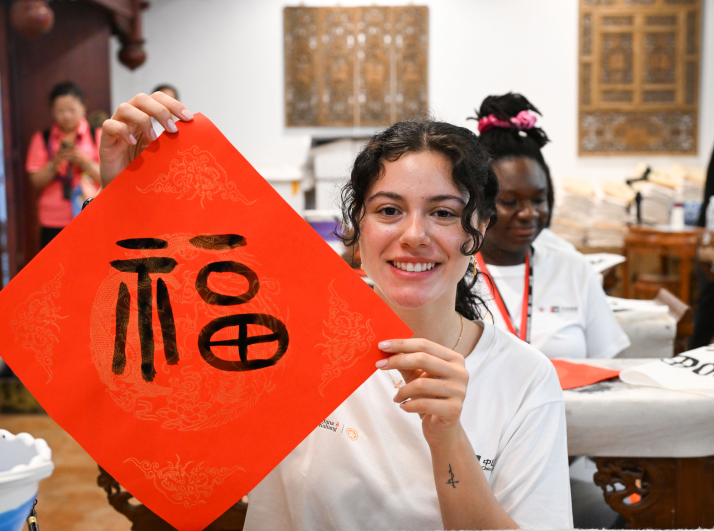 An American student holds up her calligraphy work during the China-U.S. youth choir exchange event at Beijing No.8 High School in Beijing on July 14 (WEI YAO) The Bond with Kuliang: 2025 China-U.S. Youth Choir Festival is important precisely because it offers a rare platform for direct engagement and dialogue between young people from both countries. Whether in Fuzhou or Beijing, American students spent nearly every day rehearsing, exploring and exchanging with their Chinese peers. These face-to-face encounters help dispel misunderstandings and stereotypes—often shaped by distance or media narratives—and allow both sides to discover the genuine, vibrant lives behind the headlines, fostering greater mutual understanding. Damon Terry, a 23-year-old member of the Pure-N-Heart Choir from the U.S. state of South Carolina, told Beijing Review that while he still knew little about China, he and his friends were profoundly moved by what they had seen and experienced during their weeklong visit. "I think this is something that should be continued if it hasn't been already done. Because the relationship bridge between the U.S. and China, the different cultures, the different people that come together, that is definitely something that the world needs," he said. 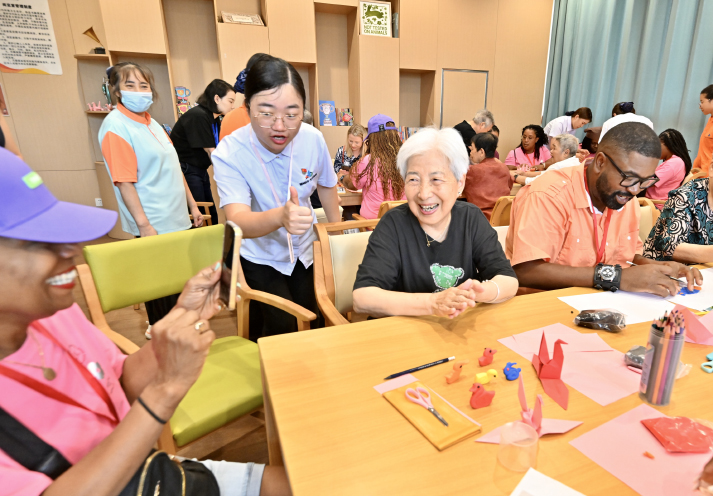 The Pure-N-Heart Choir from South Carolina, the U.S., visits an elderly care center in Fuzhou, where they spent time engaging with the senior residents on July 12 (COURTESY PHOTO) Mark Hubbard, a Grammy-nominated gospel artist from Chicago, Illinois State, joined all the Choir Week events in Fuzhou and Beijing with his 31-member choir, Mark Hubbard & The Voices, which he had first brought to China in 2013 for an international chorus festival. In an exclusive interview with Beijing Review, he said "music is a universal language" and this was one opportunity for both people from the U.S. and China to put their differences aside and come together in unity—through music. Hubbard said he often talked with the younger singers about their impressions, and many shared how they felt thoroughly impressed by it all from basically what they saw on television back home to what they actually experienced in real life inside China—two very different things. "Everything—from the way people interact to the overall experience—has been positive. It's nothing like the negative portrayals you sometimes see on TV or in the media. Being here in person has been truly rewarding, and I'm deeply grateful for the chance," he said. 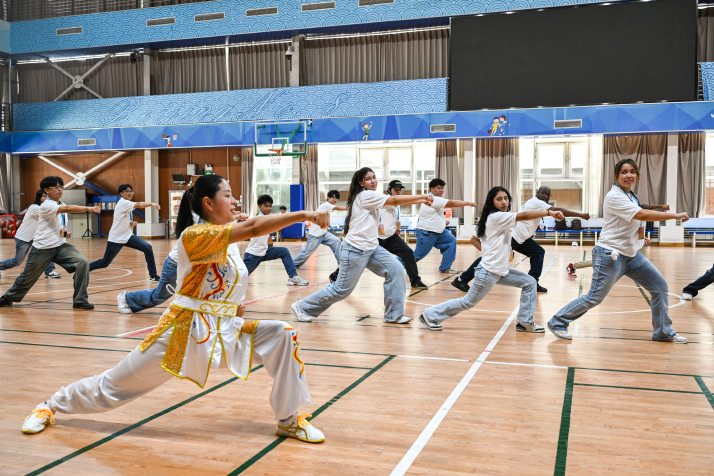 The U.S. youth delegation of the 2025 China-U.S. Youth Choir Festival learns Chinese martial arts under the guidance of teachers after a choir exchange at the Beijing No.8 High School on July 14 (WEI YAO) Singing for peace As this year sees the 80th anniversary of the victory in the Chinese People's War of Resistance Against Japanese Aggression and the World Anti-Fascist War, the 2025 Choir Week adopted Singing for Peace as its central theme. At Fujian Normal University, Sonja Poulter, conductor of the BYU Women's Chorus, addressed the gathered Chinese and American students: "As one ordinary person, I may not be able to stop the wars that rage across the world. But here and now, I know I am doing my part for peace. Because when people are singing the same song together, there will not be a war." "Once people see that we can truly come together—through music—they'll realize it sets an example for so many other things happening in the world," Hubbard said. "And I believe that if our leaders can see this too, they'll understand that we yearn for unity, for peace and for mutual love—and that this is the message we hope to share with the world." "For two major countries like China and the U.S., peaceful coexistence is our only right choice, and safeguarding world peace is our shared responsibility," Chinese Ambassador to the U.S. Xie Feng said in a video address to the Choir Week. "Can the younger generation continue to enjoy the dividends of peace, or will they be plunged back into a jungle where might is right? This depends on our choice now," he continued, "It is my hope that the youth of our two countries will sing of enduring peace and friendship, pledge never to be enemies, uphold peace hand in hand, and contribute your wisdom to bring our two countries to get over the pan-securitization predicament and leap over the Thucydides Trap." Copyedited by Elsbeth van Paridon Comments to liangxiao@cicgamericas.com |
|
||||||||||||||||||||||||||||||
|